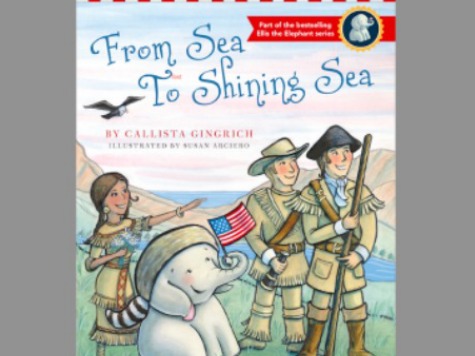I believe President Reagan would have thoroughly approved of Ellis the Elephant and his effort to teach four to eight year olds American history.
We visited the Reagan Library recently and I was reminded of the wisdom in his Farewell Address. Just before Ronald Reagan left office at the end of his eight years as president, he spoke to the American people one last time from the Oval Office. Near the conclusion of his address, he offered what he described as the traditional warning of a presidential farewell. Reagan’s worry, as the 1980s came to a close, was that children were not learning American history, and as a result were not learning what America represents in the world–as he put it, “freedom: freedom of speech, freedom of religion, freedom of enterprise.”
President Reagan warned that the long term consequences of this failure–the failure to teach our history–could be great indeed, changing our culture in ways that would squander our strengths. “If we forget what we did,” Reagan predicted, “we won’t know who we are. I’m warning of an eradication of the American memory that could result, ultimately, in an erosion of the American spirit.”
A quarter of a century later, much of what President Reagan predicted about forgetting our national heritage has come to pass. Two generations of Americans have grown up in schools that avoided teaching them what it means to be American and why they should love America. This is how we’ve come to the point where just 20 percent of fourth-graders, 17 percent of eighth-graders and 12 percent of twelfth-graders are at grade-level proficiency in American history, according to the Department of Education’s National Assessment of Educational Progress.
The solution today is the same as it was when President Reagan identified the problem in 1989: an “informed patriotism,” a love of America “grounded in thoughtfulness and knowledge.” This begins with teaching children about the truly important moments in our country’s history–about the heroes and pioneers who created America and have helped it thrive for more than 200 years.
There is no doubt that we have to fix our schools and support them in teaching American history. But the task of helping young people appreciate our nation’s past should not be limited to the classroom. It is a job for everyone who wants to be a good citizen.
Whether we are teachers, parents, grandparents or friends, we can start by finding fun and creative ways to introduce children to American history. In From Sea to Shining Sea, my new book for four to eight-year olds, Ellis the Elephant joins the Lewis and Clark expedition as they venture west into unknown territory. Ellis helps children see that courage matters, having big dreams matters, and patriotism matters.
The work of Lewis and Clark is a perfect example of the challenges we face educating young people about our country’s past. Today a majority of fourth graders don’t know the purpose of the Lewis and Clark expedition, Department of Education data show. Most fourth graders can’t say why the pioneers moved west. And two-thirds don’t understand that westward migration resulted in new states being added to the union.
In light of such challenges, we have to take every opportunity to help inspire a love for American history. Our country is full of wonderful historical sites and museums, from Mount Vernon and Monticello in the east to Lewis and Clark’s Pacific campsites in the west. There are even some great apps available to help kids discover history right from their smartphones.
Take the time to help the young people in your life learn about the remarkable achievements of those who came before us. Only if we help the next generation of Americans appreciate what is so special about America can we make sure our country remains for the world the beacon of liberty that President Reagan believed in so deeply.

COMMENTS
Please let us know if you're having issues with commenting.